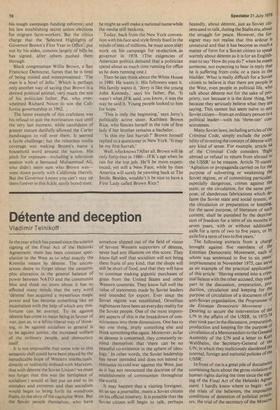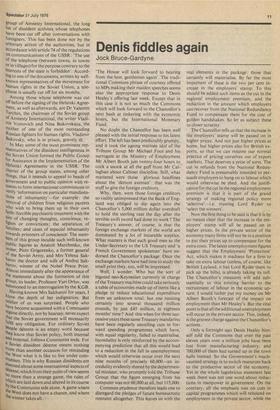Détente and deception
Vladimir Telnikoff
In the year which has passed since the solemn signing of the Final Act of the Helsinki Agreement, there has been constant speculation in the West as to what exactly the Kremlin means by detente. The unconscious desire to forget about the catastrophic alteration in the general balance of power between NATO and the communist bloc and think no more about it has so affected many minds that the very word 'détente' has acquired a mysterious magic power and has become something like an incantation with the help of which any misfortune can be averted. To be against detente has come to mean being in favour of war, just as, to a leftist-liberal way of thinking, to be against socialism in general is to be against justice, the increased welfare of the ordinary people, and democracy itself.
It is not impossible that some role in this semantic shift could have been played by the ineradicable hope of Western intellectuals, directly or indirectly imbued with Marxism, that with détente the Soviet Union ('we must not forget that this was the birthplace of socialism') would at last put an end to its mistakes and extremes and that socialism would begin to bring forth its wondrous fruits, to the envy of the capitalist West. But the Soviet people themselves, who have somehow slipped out of the field of vision of fervent Western supporters of détente, never had any illusions on this score. They know full well that socialism will not bring them fruits of any kind, that the shops will still be short of food, and that they will have to continue making gigantic purchases of grain from the United States and other Western countries. They know full well the value of statements made by Soviet leaders and intended for export. Ever since the Soviet regime was established. Orwellian nightmares have been an everyday reality for the Soviet people. One of the most important aspects of this is the breakdown of consciousness into three dimensions. One has to say one thing, imply something else and think something else again. Moreover, as far as détente is concerned, they constantly remind themselves that 'there can be no peaceful co-existence in the sphere of ideology.' In other words, the Soviet leadership has never intended and does not intend to renounce its cold war against the West, just as it has not renounced the doctrine of the establishment of communism throughout the world.
It may happen that a visiting foreigner, let us say a journalist, meets a Soviet citizen on his official itinerary. It is possible that the Soviet citizen will begin to talk, perhaps
heatedly, about detente, just as Soviet citizens used to talk, during the Stalin era, about the struggle for peace. However, the foreigner may not realise that this ardour Is unnatural and that it has become as much a matter of form for a Soviet citizen to speak warmly about détente as it is for an Englishman to say 'How do you do ?' when he meets someone, not expecting to hear in reply that he is suffering from colic or a pain in the bladder. What is really difficult for a Soviet citizen to believe is that there are people in the West, even people in political life, who talk about détente not for the sake of propriety, not because it is the done thing, but because they seriously believe what they are saying. This cannot but seem naïve to anY Soviet citizen—from an ordinary person to a political leader—with his 'three-tier' consciousness.
Many Soviet laws, including articles of the Criminal Code, simply exclude the possibility of investing the concept of détente with any kind of sense. For example, article 64 of the Criminal Code considers 'flight abroad or refusal to return from abroad to the USSR' to be treason. Article 70 states: 'Agitation or propaganda carried on for the purpose of subverting or weakening the Soviet regime, or of committing particular, especially dangerous, crimes against the state, or the circulation, for the same purpose, of slanderous fabrications which defame the Soviet state and social system, or the circulation or preparation or keeping, for the same' purpose, of literature of such content, shall be punished by the deprivation of freedom for a term of six months to seven years, with or without additional exile for a term of two to five years, or bY exile for a term of two to five years.'
The following extracts from a charge brought against five members of the Estonian Democratic Movement, each ol: whom was sentenced to five to six years imprisonment in November 1975, can serve as an example of the practical application of this article: 'Having entered into a criin" inal liaison with the other accused, they took part in the discussion, preparation, Production, circulation and keeping for the purpose of circulation of a document of an anti-Soviet organisation, the Programme of the Estonian Democratic Movement . • ' Desiring to secure the intervention of the UN in the affairs of the USSR, in 1972-74 they took part in the discussion, preparation, production and keeping for the purpose of circulation of a Memorandum to the General Assembly of the UN and a letter to Kurt Waldheim, the Secretary-General of the UN, in which they maliciously slandered the internal, foreign and national policies of the USSR'.
In front of me is a great pile of documents, containing facts about the gross violation °I human rights during the time since the sign" ing of the Final Act of the Helsinki Agre,eke ment. I hardly know where to begin: wit" the trials of the believers, the impossible conditions of detention of political prison' ers, the trial of the secretary of the Moscow
group of Amnesty International, the long list of dissident activists, whose telephones have been cut off after conversations with foreigners. This has been done not by the arbitrary action of the authorities, but in accordance with article 74 of the regulations on communications of the USSR: 'The use of the telephone (between towns, in towns or in villages) for the purpose contrary to the Interests of the state is forbidden'. According to one of the documents, written by wellknown representatives of the movement for human rights in the Soviet Union, a telePhone is usually cut off for six months.
Among those whose telephone was cut off before the signing of the Helsinki Agreement, as well as afterwards, are Dr Valentin Turchin, the chairman of the Soviet group Of Amnesty International, the writer Vladimir Voinovich and Nina Bukovskaya, the Mother of one of the most outstanding Russian fighters for human rights, Vladimir Sukovsky, who is in prison, gravely ill.
In May some of the most prominent representatives of the dissident intelligentsia in the Soviet Union formed the Public Group for Assistance in the Implementation of the Helsinki Agreements in the USSR. The Charter of the group states, among other things, that it intends to appeal to heads of government and to public opinion with requests to form international commissions to verify 'information on particular manifestations of inhumanity'—for example: the removal of children from religious parents if"ho wish to bring them up in their own faith: forcible psychiatric treatment with the 4,111) of changing thoughts, conscience, religion or convictions; the separation of families; and cases of especial inhumanity towards prisoners of conscience. The members of this group inculde such well-known public figures as Anatoli Marchenko, the Writer, Piotr Grigorenko, a former general of the Soviet Army, and Mrs Yelena Sakharov the doctor and wife of Andrei Sakharov, winner of the Nobel Peace Prize. Almost immediately after the appearance of the statement about the formation of this group, its leader, Professor Yuri Orlov, was summoned to an interrogation by the KGB. , Having known Mrs Sakharwi for years, I itilovv the depth of her indignation. But neither of us was surprised. People who have become acquainted with a Communist regime directly, not by hearsay, never expect that the Soviet government will necessarily fulfil any obligation. For ordinary Soviet People détente is an empty word because they. know that Soviet policy, both internal atd external, follows Communist ends. For a Soviet dissident détente means nothing More than another occasion for reminding the West what it is like to live under cornMunism. This is why Russian dissidents are alarmed about some international aspects of detente, which from their point of view seems no More than a strange game, the rules of Which are laid down and altered in its course bY the Communist side alone. A game where the West does not have a chance, and where the winner takes all.



































 Previous page
Previous page